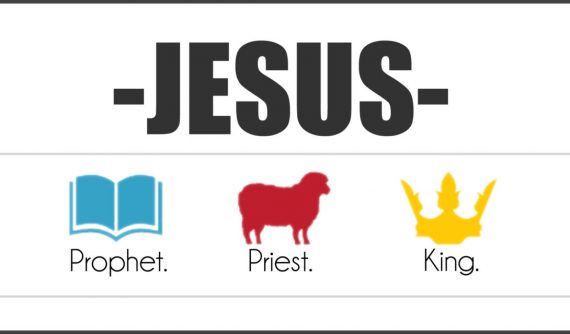When someone talks about Christ, everybody knows they are talking about Jesus. Yet few people realize that the word “Christ” is not a name, but a title.
Defining Christ
 The word Christ comes from the Greek word christos, and is not actually a translation of the word, but a transliteration. The Greek letters of christos have simply been changed into English letters so that we get the word Christ. The same is true of the Hebrew equivalent, Messiah (Heb., Mashiach; cf. John 1:41).
The word Christ comes from the Greek word christos, and is not actually a translation of the word, but a transliteration. The Greek letters of christos have simply been changed into English letters so that we get the word Christ. The same is true of the Hebrew equivalent, Messiah (Heb., Mashiach; cf. John 1:41).
The words themselves mean “anointed one” and can refer to someone who has been specially chosen by God to fulfill a function or complete a specific task, such as a king (1 Sam 9:16; 2 Sam 2:4-7; 1 Kings 1:34-45; Isa 45:1), priest (Exod 28:41; 30:30), or prophet (Isa 61:1). While the anointing upon these individuals was initially performed with oil, it later came to be thought of primarily as a spiritual anointing by God.
However, it is important to note that the term Christ has nothing to do with being divine. That is, while it is a biblical and theological fact that Jesus was fully God, we do not get this idea from the fact that Jesus is the Christ.
Yes, Jesus Christ is God incarnate. Yet “Christ” does not mean “God.” Even though I can say “The sky is blue” and “The sky is up,” this does not mean that the word “blue” means “up.” It doesn’t.
So also, even though the Bible teaches that “Jesus is the Christ” and that “Jesus is God,” the two statements are not theologically equivalent. Both statements are true, but both statements are saying different truths about Jesus.
After all, if Christ, or Mashiach, meant “God,” then what would the Bible be saying about those other individuals in Scripture, such as David, Saul, or Cyrus, who also called Mashiach?
It is best therefore, to think of the titles Christ or Messiah, as referring to someone who has received a special anointing by God to perform a specific task or purpose. Such a definition is true of every anointed person, whether it is a king, a prophet, a priest, or Jesus Himself.
“Christ” means “Anointed One”
In the Gospel accounts of Matthew, Mark, Luke, and John, the title of “anointed one” (Mashiach or Christos) is used almost solely in reference to Jesus Christ. Paul takes the term even further so that it often refers not just to Jesus, but also to all who are in Jesus as part of His church (cf. Gal 3:27; Eph 3:4).
Eventually, the term “Christ” became so closely associated with the followers of Jesus, that eventually we became known as “Christians.”
So what is the best translation for the term Christ? While “anointed one” might be the most accurate translation, it is a bit of a mouthful to say “Jesus the Anointed One” all the time.
So is there a shorter term that might be preferable? Since most of the examples of anointed people in Scripture refer to prophets, priests, and kings, it is best to understand the term Christ in similar ways when it refers to Jesus.
Jesus is the pre-eminent prophet (Acts 3:18-24), priest (Heb 4:14-16), and king (Rev 19:16). Jesus is authoritative in how He judges, what He says, and where He leads.

Due to the wide variety of Messianic descriptions in the Old Testament, the Hebrew people often wondered what the Messiah would be like when He came. Would He be a king? A priest? A judge? A prophet? A deliverer? Would He be some combination of these, like the Priestly-King Melchizedek (Heb 5:5-11)?
When Jesus finally did arrive and declare Himself as the Messiah, the answer to all such questions was “Yes!” To speak of Jesus as the Christ is to speak of Him as our King, Priest, Prophet, Judge, Lord, Master, and Savior.
To speak of Jesus as the Christ is not only has the governmental role of ruler and king in view, but also the spiritual roles of prophet and priest, the legal roles of judge and counselor, and the personal roles of friend and brother.
So as it turns out, maybe the term Christ, left untranslated from the Greek christos, is the best word after all, as long as we recognize the rich significance and meaning of this term.
If you take all the roles from all the anointed leaders through all of biblical history, and combine them all together into one person, He looks just like Jesus Christ.
Jesus is the anointed King-Priest-Prophet-Judge-Lord-Master-Ruler-Savior.
As such, Jesus Christ rules and reigns not just over eternity, but also over every aspect of our lives here on earth as well.

“Christ” and the Gospel
This understanding of Christ is critical for a proper understanding of the biblical gospel. There are some people in Christianity who think that the gospel is only about how to go to heaven when you die.
The truth, however, is that while the gospel does tell us how to have eternal life so that we can go to heaven when we die (I call this “The Target Truth” in The Gospel According to Scripture), this truth is relatively small compared to the large number and wide variety of gospel truths contained within the Scriptures.
The gospel message of Jesus Christ is not primarily about how to go to heaven when we die, but is instead about how to follow Jesus on this earth while we live.
The gospel is more about this life than about the next. And Jesus as “the Christ” shows and instructs us how to live this life.
When we see that Jesus as the Christ claims authority and preeminence over every aspect of our lives, this helps us learn to follow Him and seek His guidance as we go about our days and interact with others. Serving Jesus as our Lord and Master reminds us that we do not serve human kings or presidents, but only King Jesus. Our affiliation is not to a political party, but to the Kingdom of God (Acts 17:2-7).
 So when we read about Jesus Christ in the Bible, or when we read about how Christians are in Christ, it is important to not over-spiritualize word Christ, but instead to recognize that a statement is being bad about the Lordship and Mastery of Jesus over all things.
So when we read about Jesus Christ in the Bible, or when we read about how Christians are in Christ, it is important to not over-spiritualize word Christ, but instead to recognize that a statement is being bad about the Lordship and Mastery of Jesus over all things.
Yes, the term Christ itself means “anointed one” but Jesus was anointed to rule and reign over all things. The term Christ reminds us that as Christians, we follow Jesus as our Lord, Master, Ruler, and King.
In this way, the term Christ is central to the gospel because without Jesus as the Christ, there is no gospel. The good news message about Jesus is often described by Paul as “the gospel of Christ” (cf. Rom 1:16; 1 Cor 9:12; Gal 1:7).
If we want to understand the gospel, we must understand what it means for Jesus to be the Christ, the Messiah, the Anointed One of God, the Kingly and Priestly Ruler of all.
There are over 500 references in the New Testament which mention the term Christ. We cannot look at all of them, so let us consider one key text which reveals what it means for Jesus to be the Christ.
John 20:31 – Jesus is the Christ
… but these are written that you may believe that Jesus is the Christ, the Son of God, and that believing you may have life in His name (John 20:31).
I stated above that the word Christ is not directly equivalent to being divine. That is, even though Jesus is God, and even though Jesus is the Christ, the two statements are not equivalent.
Though the title Christ carries rich theological symbolism and significance, one idea it does not carry is that of divinity.
Nevertheless, there are verses that seem to teach this connection. John 20:31 is one such verse. Some people use John 20:31 as evidence that divinity is included within the concept of Christ, for this text defines the word Christ with the phrase “the son of God.” A closer inspection of this passage reveals what John is really saying.
John 20:30-31 contains the purpose statement for the Gospel of John. He says that he wrote his Gospel account so that those who read it might believe that Jesus is the Christ, the Son of God, and that by believing they might have life in His name. This does indeed fit with what John writes in his Gospel.
Many refer to the fourth Gospel as “The Gospel of Belief” for it explains over and over that God gives eternal life to anyone who believes in Jesus for it (cf. John 3:16; 5:24; 6:47).
Since Matthew, Mark, and Luke are written more for Christians to help us learn how to follow Jesus in the path of discipleship, the purpose of John’s Gospel makes it the best one for unbelievers to read. John specifically wrote his Gospel account so that unbelievers might believe in Jesus.
 However, John did not write this Gospel account only for unbelievers. While he emphasizes over and over how a person can believe in Jesus for eternal life, John also knows that God wants much more for us than to just believe in Jesus.
However, John did not write this Gospel account only for unbelievers. While he emphasizes over and over how a person can believe in Jesus for eternal life, John also knows that God wants much more for us than to just believe in Jesus.
Though it is critically important for someone to believe in Jesus for eternal life, this is only the beginning of all that God has for us in Jesus Christ.
God not only wants us to have life; He wants us to have it in abundance (John 10:10; see Abundant Life).
The Gospel of John is not just about how to receive eternal life, but is also about how to fully experience this life in Jesus.
So although John is the best Gospel for nonbelievers to read, there is lots of discipleship truth in this Gospel for believers as well.
John wants Christians to have all of the life that Jesus has for us, not just eternal life, but also the full experience of eternal life in Jesus Christ. And this comes, not just by believing in Jesus for eternal life—which is emphasized all over in the Gospel of John—but also by believing that Jesus is the Christ, that is, that He is King, Ruler, Master, Lord, and Savior.
Does saying that “Jesus is the Son of God” mean “Jesus is God”?
But what about that phrase “Son of God”? Does not this mean that Jesus is God?
Well, like “Christ,” the term “Son of God” is also a title. The way John uses this title in the verse shows that the two terms mean the same thing. John explains the word “Christ” with the term “Son of God.”
Since many people think that the title “Son of God” means “God,” they then conclude from this text that the term “Christ” also means “God.” But it does not.
During the Roman Empire, especially beginning with Caesar Augustus and following, the Caesars often referred to themselves as sons of God. By this, they were not claiming to be God incarnate, nor were they claiming (in most cases anyway) that they were the biological offspring of a Roman deity and a human woman.
By taking the title “the son of God,” the Caesars were saying that while they had been born as a human being to human parents, they had now become the adopted child of the gods. This status as adopted sons of God conferred upon them all the power and privilege that came with being part of the divine family, which meant that the Caesars had the divine right to rule over the Roman Empire.
So the title “son of God” is not primarily about being God or becoming a God, but is instead about ruling with the authority of God. Like the title “Christ,” it is about being King, Lord, Ruler, and Master over all things.
When a Caesar declared himself to be a son of God, he was not saying he was God, but was instead claiming that he had the right to rule and govern the Roman Empire.
This also is what it means to refer to Jesus as the Son of God, except that Jesus does not only rule over the Roman Empire, but over every kingdom, empire, and country on earth.
So here at the end of his Gospel account, John explains that he wrote his Gospel so that those who read it might believe that Jesus has the right to rule over all areas of life.
Not just over every corner of ever countries, however, but also over every act and thought of all people. John wants people to believe in Jesus not just for eternal life, but also for every other aspect of life as well.
Those who believe this will have the full experience of life that God wants for us. This is what it means to believe that Jesus is the Christ, the Son of God (cf. 1 John 4:2-3, 15).
To learn more about the title “Christ,” and the meaning of other texts that use this term, take the Lesson on Christ in my Gospel Dictionary online course.
 Understanding the Gospel requires us to properly understand the key words and terms of the Gospel. Take my course, "The Gospel Dictionary" to learn about the 52 key words of the Gospel, and hundreds of Bible passages that use these words.
Understanding the Gospel requires us to properly understand the key words and terms of the Gospel. Take my course, "The Gospel Dictionary" to learn about the 52 key words of the Gospel, and hundreds of Bible passages that use these words.
This course costs $297, but when you join the Discipleship group, you can to take the entire course for free.




 The Book of Life is a translation from the Greek phrase tō biblō tēs zōēs. The phrase “the Book of Life” or “the Book of the Living” are fine translations for this phrase.
The Book of Life is a translation from the Greek phrase tō biblō tēs zōēs. The phrase “the Book of Life” or “the Book of the Living” are fine translations for this phrase. Whichever approach you choose, it is important to note that while Scripture does teach about getting blotted out of the Book of Life, this does not ever refer to losing eternal life. While a person might get their “penciled” name erased from the Book of Life when they die, once a person’s name is written in permanent ink, it cannot ever be blotted out.
Whichever approach you choose, it is important to note that while Scripture does teach about getting blotted out of the Book of Life, this does not ever refer to losing eternal life. While a person might get their “penciled” name erased from the Book of Life when they die, once a person’s name is written in permanent ink, it cannot ever be blotted out. He says he will come like a thief in the night (Rev 3:3), but this does not mean that He will come to kill them or take away their eternal life. Jesus says that unfaithful servants will not be honored the same way that faithful servants will be, but He is not saying that unfaithful servants will be cast out, killed, or have eternal life removed from them.
He says he will come like a thief in the night (Rev 3:3), but this does not mean that He will come to kill them or take away their eternal life. Jesus says that unfaithful servants will not be honored the same way that faithful servants will be, but He is not saying that unfaithful servants will be cast out, killed, or have eternal life removed from them.
 1 John 1:7-10 does get discussed in various ways through my online course “
1 John 1:7-10 does get discussed in various ways through my online course “ And while it is true that they might be guilty of some of the things we accuse them of, the human tendency is to amplify the sinful behavior of others so that we can turn them into monsters, and dehumanize them, so that we can condemn them, or send them into exile, or even kill them in the name of God.
And while it is true that they might be guilty of some of the things we accuse them of, the human tendency is to amplify the sinful behavior of others so that we can turn them into monsters, and dehumanize them, so that we can condemn them, or send them into exile, or even kill them in the name of God. There are
There are  The blood of Jesus is not a spiritual antidote to sin which somehow removes the polluting presence of sin from our lives.
The blood of Jesus is not a spiritual antidote to sin which somehow removes the polluting presence of sin from our lives. John is primarily interested in make sure that his readers recognize how they have been involved in the violent, bloody, accusatory, scapegoating practices that run this world, and turn from such behaviors to walk in the light of God’s love.
John is primarily interested in make sure that his readers recognize how they have been involved in the violent, bloody, accusatory, scapegoating practices that run this world, and turn from such behaviors to walk in the light of God’s love.

 But if God doesn’t demand blood, then how does God forgive? Doesn’t Hebrews 9:22 teach that God needs blood in order to forgive us? No, it does not. Let us read carefully what Hebrews 9:22 says in context.
But if God doesn’t demand blood, then how does God forgive? Doesn’t Hebrews 9:22 teach that God needs blood in order to forgive us? No, it does not. Let us read carefully what Hebrews 9:22 says in context.



 The basic message of Ephesians is that due to religion, humans have lived in rivalry and violence with each other since the foundation of the world, but now, in Jesus Christ, we have been shown a new way of living life so that all the hostilities can now cease.
The basic message of Ephesians is that due to religion, humans have lived in rivalry and violence with each other since the foundation of the world, but now, in Jesus Christ, we have been shown a new way of living life so that all the hostilities can now cease.
 Paul’s point in these verses is that even though we humans accusation, blame, condemn and kill others in God’s name (Ephesians 2:1-3), God Himself does not behave that way toward us.
Paul’s point in these verses is that even though we humans accusation, blame, condemn and kill others in God’s name (Ephesians 2:1-3), God Himself does not behave that way toward us. By looking at Ephesians 1:7 and Ephesians 2:13, we now understand how the blood of Jesus redeems us.
By looking at Ephesians 1:7 and Ephesians 2:13, we now understand how the blood of Jesus redeems us.